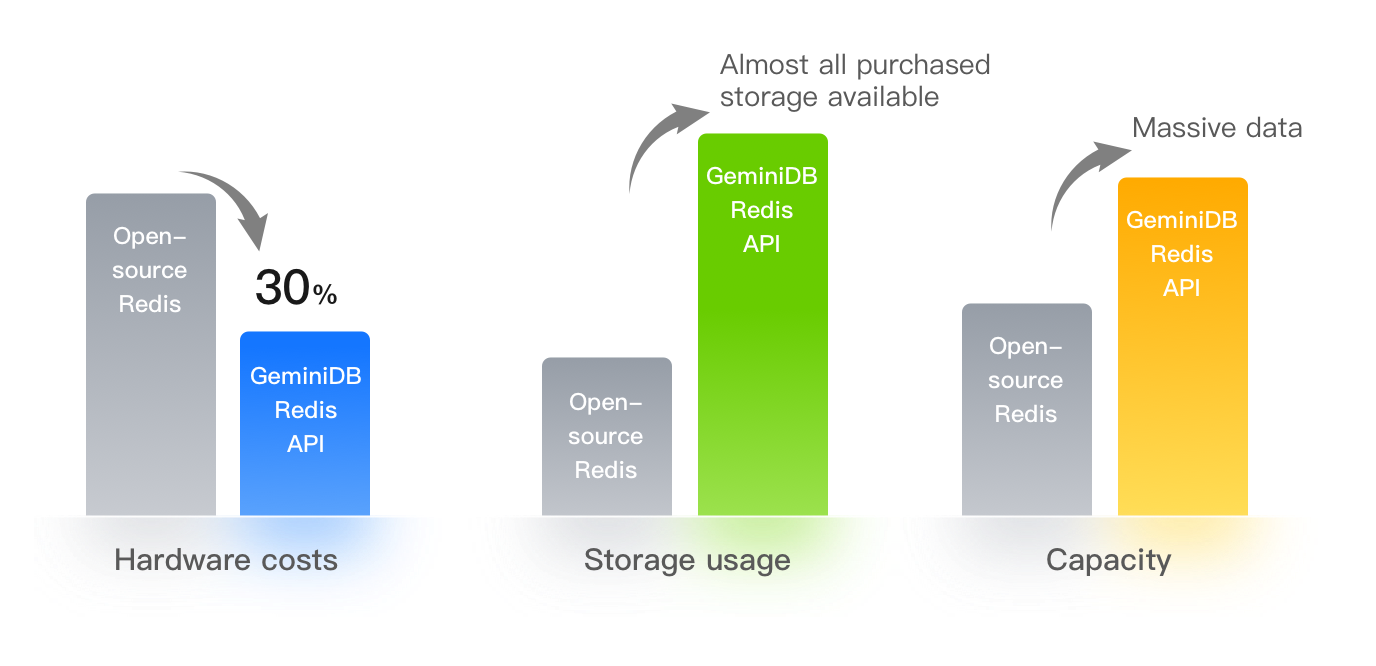Why GeminiDB Redis API?
Enhanced Capabilities: High Stability, Scalability, and Easy O&M
High stability: Three copies of data ensure strong data consistency, high reliability, and prevent dirty reads. Superlative fault tolerance (N-1 reliability) ensures that if a node should fail, services can be taken over in seconds and all data is accessible.
Low costs: High-performance storage pools help you keep hardware costs under control. GeminiDB Redis API is not affected by forks, and it improves storage utilization.
Easy scalability: GeminiDB Redis API supports multithread concurrency and on-demand horizontal scaling. All nodes are writable, making it suitable for handling traffic peaks.
Fast scaling: Capacity can be scaled in seconds with no downtime. Concurrency scaling can be completed in minutes, with only a few seconds of interruption.

High Reliability: Strong Consistency and Stable Performance
Open-source Redis is an in-memory database with average reliability. Service design is impacted when data in the primary and standby nodes is inconsistent. Open-source Redis uses a single thread, which means command blocking is more likely. If a fork is called during snapshot creation and primary/standby replication, this causes performance jitter. GeminiDB Redis API can address these issues.
High data reliability: Three data copies are stored in a distributed shared storage pool, ensuring high data reliability and strong consistency for multi-point access.
High availability: Superlative fault tolerance (N-1 reliability) ensures that if a node is faulty, services can be taken over in seconds with little impact on services.
Stable performance: GeminiDB has stability designed in, from end to end, with distributed multithreading at the compute layer and remote direct memory access (RDMA) at the storage layer. The RocksDB storage engine is optimized, and cold and hot data separation accelerates hotspot data access.
re.png)
Low Cost: 30% Lower Cost but with Larger Capacity
Open-source Redis is an in-memory database and is very expensive. Its memory usage needs to be kept below 50% to avoid forks. Open-source Redis cannot handle massive data due to limitations defined in the gossip protocol. GeminiDB Redis API can process more data more easily than open-source Redis.
Low usage cost: Allow you to select compute and storage resources independently, which can reduce costs by over 30%.
High usage: GeminiDB Redis API uses a self-developed forkless architecture. Almost all purchased persistent storage is available. GeminiDB Redis API combines physical and logical compression, occupying less space. Fine-grained control is provided on storage.
Large capacity: GeminiDB Redis API uses decoupled storage and compute and is great for scenarios with a large amount of data. It addresses caching issues and can carry more important service data for a long time.

Elastic Scaling: Smooth Capacity Expansion Within Seconds
Nodes in an open-source Redis cluster use the local memory for data storage. Scaling its capacity is time-consuming as it entails adding nodes and migrating some of the data. No data needs to be migrated when you scale a GeminiDB Redis database.
Dynamic load balancing: Built-in proxy clusters support dynamic load balancing. The compute resource utilization is high, and no additional data sharding is required.
Scaling compute resources in minutes: Compute nodes can be added in minutes with a few clicks. GeminiDB Redis API uses an architecture with decoupled storage and compute, so data will not be migrated during capacity expansion.
Scaling storage space in seconds: Storage space can be scaled up in seconds, in 1 GB increments. The distributed shared storage pool ensures you can scale-up storage smoothly and services will not be affected.
.png)
Security O&M: Dedicated Cloud Service with One-Stop O&M
Launching an ECS-hosted DB cluster takes too long as you have to purchase, deploy, and maintain the hardware and software. Using GeminiDB Redis API, you can easily create DB clusters without having to purchase hardware separately. GeminiDB Redis API makes it easier to stay focused on your applications and on your users.
Easy data migration: GeminiDB Redis API provides mature, one-stop data migration solutions. Data can be migrated from various key-value databases and engines, such as Redis, SSDB, Pika, Kvrocks, LevelDB, and RocksDB, to GeminiDB Redis API. GeminiDB Redis API is fully compatible with Redis, so your services can be quickly moved to the cloud.
Security O&M: GeminiDB Redis API provides comprehensive security measures, such as VPCs, subnets, security groups, Anti-DDoS, and SSL, helping you defend against a wide range of attacks to keep your data secure. GeminiDB Redis API also provides instance monitoring, API management, fault alarm, and automatic backup.
Technical support: Professional kernel teams provide 24/7 technical support and source code–level security.
.png)
Comprehensive Solutions
Comprehensive Solutions
More GeminiDB APIs
More GeminiDB APIs
GeminiDB Mongo API
A MongoDB-compatible document database
GeminiDB Cassandra API
A wide-table database with high performance
GeminiDB Influx API
A high-performance time series database




